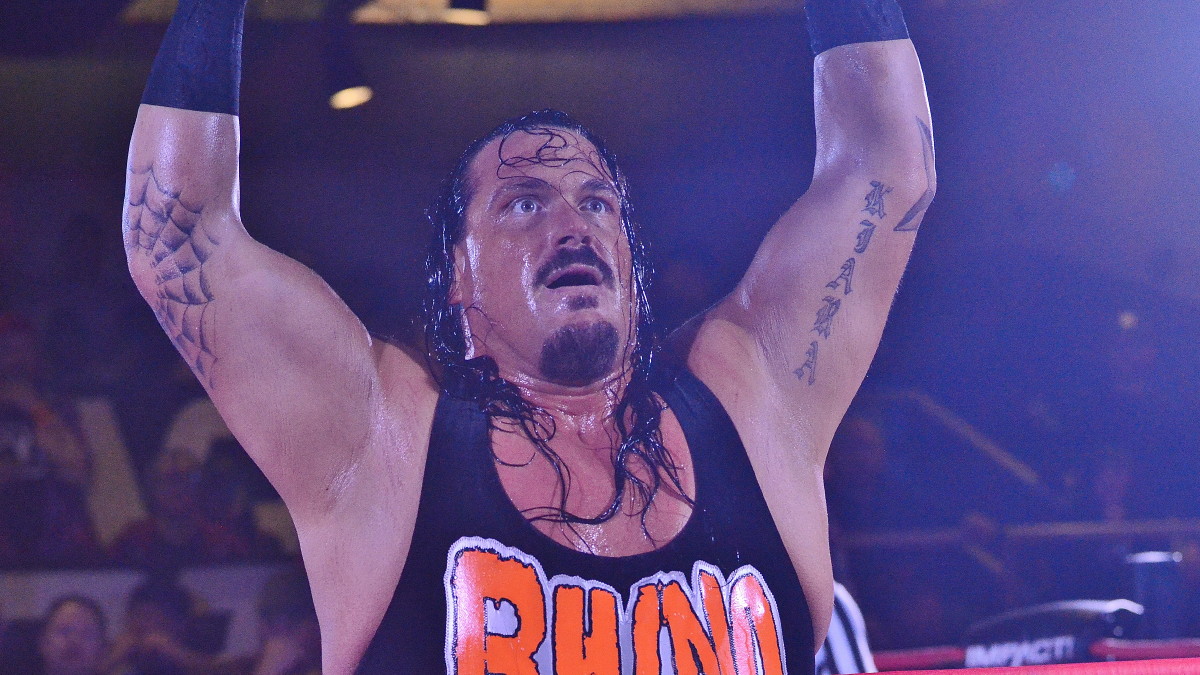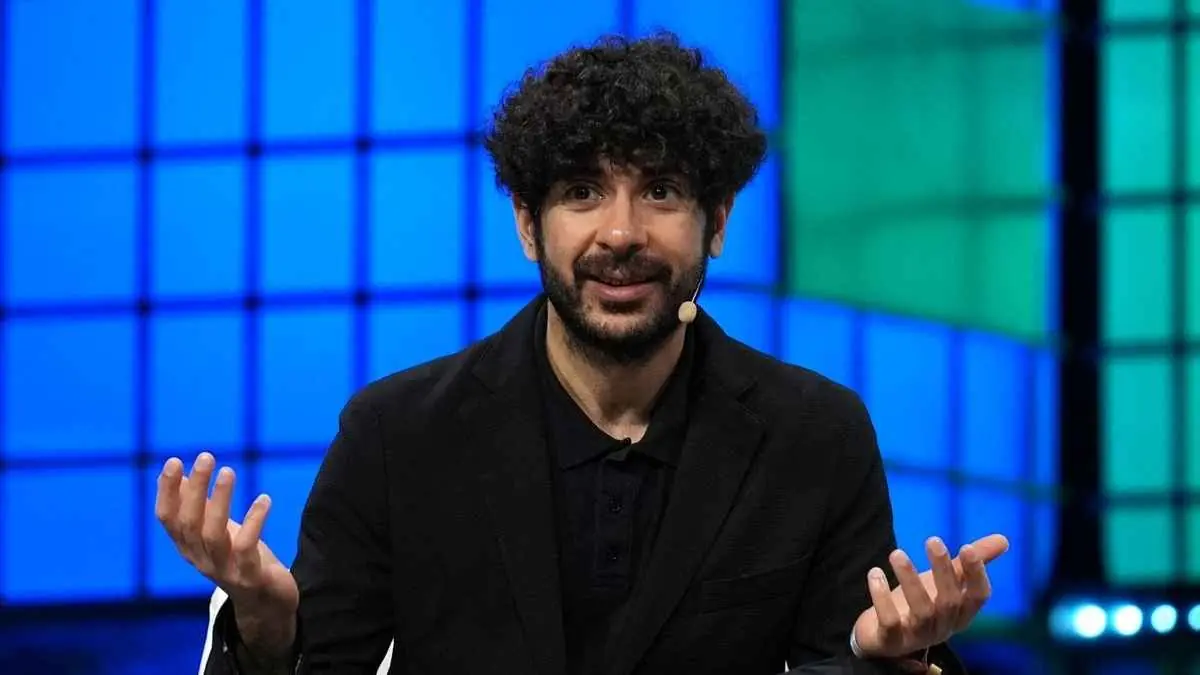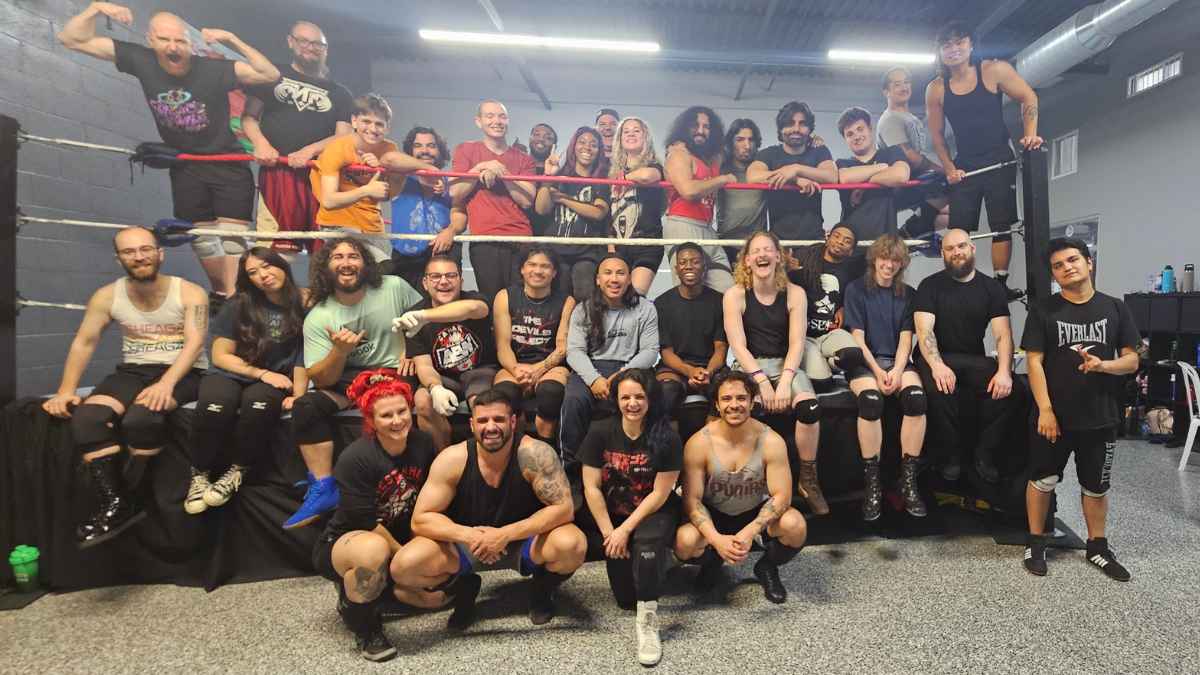In talking to Terry “Rhino” Richards, you soon realize that the age-old stereotype of the “big, dumb wrestler” doesn’t apply here. While Richards is certainly big, weighing in at 285 lbs, the Detroit, Michigan native is anything but dumb.
Ask him his opinion about American and Canadian relations and his knowledge becomes instantly apparent. Richards admits to be disappointing in the declining morals of his country. “To be honest with you, I respect the people who go into the armed forces, but I would never go because I don’t think what America today is, I don’t think its worth dying for. You’ve got the President who wouldn’t go to the Vietnam War. How can he, or how can any President, send troops to war? I know it’s in the best interests, but today I think it’s more a business.”

He is deeply disappointed in President Clinton, especially. “I mean, I don’t care who you are, if you don’t love your wife, you shouldn’t be with her. If you love her, you shouldn’t do stuff like (having an affair). I think it just shot the morals in America today.”
In 1997, he joined a wrestling group in Detroit called “Thug Life” that included Joe E. Legend, Christian Cage (The Brood’s Christian), Sexton Hardcastle (The Brood’s Edge) and Bill Skullion. Their anti-American stance mirrored that of Bret Hart in the WWF. “We didn’t steal it from them; I’m sure they had something like that in mind for a while. It just happened to come out at the same time.”
The group met while wrestling out in Winnipeg and on Indian Reserves out west. The other members of “Thug Life” made Richards an honoury Canadian. “I really do like Canada.”
One of the group’s anti-American actions included Joe E. Legend and Hardcastle burning an American flag during a card, to upset the American fans. Richards was not at ringside for the incident, but is quick to defend his former teammates. “It’s not against the law anymore to publicly burn a flag.”
Richards took no offence to the action. “As far as that goes, I don’t disagree with it and I didn’t get mad at them.” Looking back on the incident, he adds “If we went back in time, I would have been mad, but now I wouldn’t.”
He is equally conversant in the topic of his trade pro wrestling. “Fake is a hardcore word for it, because there’s so many injuries. Wrestlers don’t have a season; it’s all year round.”
While the WWF may claim wrestling is sports entertainment, Richards disagrees with them somewhat. “It’s a sport, because you have to be an athlete. You have to be well-tuned in cardio-vascular. (You have to be in) very good shape. It’s very tough.”
After a match, Richards can attest to how tough it is. “I’m sore, my body’s beat up. I don’t think it’s fake.”
He maintains that parents need to “step back” and instruct their children: “Don’t do this stuff.”
Richards knows first hand the dangers of children trying to emulate the wrestlers they see on TV and in the arenas. “I know a fourteen-year-old kid… he’s eighteen now… and he broke his neck. It’s sad because he’s paralyzed from the chest down. Let the kids know ‘Don’t try this stuff’.”
“It’s really not acting,” Richards maintains, saying that the wrestler’s in-ring image and mood is based more on reality than some might think. “A lot of people just dig deep and bring their personality out,” Rhino explains, adding that “Before I go out and wrestle, I just think of a lot things that (anger me) and take it out on the fans and they just react.”
“It’s easy to be yourself, hard to be something you’re not.”
“It’s really a rough business, you gotta be dedicated, ” Richards says about his sport. “That’s more or less (like) anything, any type of occupation.”
Richards can see the link between American politics and morals and pro wrestling. “Whatever happens outside the ring ends up falling inside the ring. Look at Hulk Hogan, a couple of things he did with Monica Lewinsky look-a-likes, and the cigar and stuff like that, which draws the money.
“As far as the role the WWF took, as far as more hardcore, more women, (it’s) not good morals, as opposed to what it was in the eighties. Good vs. Evil, good always won.” Today, Richards notes that “Well, good still overcomes evil, but in a more sluttier way.”
Richards caught the wrestling bug in high school. In addition to playing football for eight years, he also excelled in amateur wrestling, “went to State (championship), sophomore, junior, senior years.” The younger Richards might not have been recognizable next to the huge wrestler we see today. “I was only 5’8″ when I was graduating from high school. I had a little growth spurt and started training in the gym.”
His training and exposure to area independent wrestling got Richards to thinking about a pro career of his own. He then contacted Scott D’Amore of Windsor to train him. He was soon wrestling for Border City Wrestling, a Windsor-based promotion that D’Amore was affiliated with.
Wrestling has taken Richards all over the world, including working in Austria and Germany for promoters Otto Wanz and Pierre Williams, in the 1997-1998 seasons.
Wrestling in Europe has been very good to Richards. He won several CWA (Catch Wrestling Alliance) World Tag team titles, with Jean-Pierre Lafite and Joe E. Legend. He and Legend still hold those titles. He also wrestled what he considers to be his greatest match against Hans Shueman in Germany. “It went nine rounds, nine three-minute rounds. I didn’t win, but it’s probably one of the best matches I’ve had. Big crowd. It was my first time overseas. It went back and forth. He went all out; I went all out. From what I’ve heard from other wrestlers, it was probably the best championship match that year.”
But the happiness that Richards found in Germany was not limited to his in-ring success. He also met his future bride there.
In comparing wrestling in Europe to North America, Richards says that “over here, there’s more entertainment thrown in for the big bucks. Over there, it’s still a competitive sport. When the houses were down over here in the early nineties as far as attendance, they were up over there. Their economy was better than ours, and that has a lot to do with it.”
In terms of the nature of the sport between the two continents, Europe “has rounds. It’s more of a competitive sport, it’s more like amateur wrestling. It’s still professional wrestling, but it’s a lot harder.”
Since his return from Europe, Richards has made his way to the Philadelphia-based ECW, which he credits to “knowing a couple of people.” After a tryout match, Richards caught the eye of promoter Paul Heyman, aka Paul E. Dangerously. He worked with Heyman for a while longer and “one thing leads to another.”
While appearing at a UCW card in London, Richards got a phone call telling him that Heyman wanted him to come to Philadelphia the next day.
“I’m just trying to get my foot in the door right now.” Richards notes.
Richards has high praise for the Philadelphia-based hardcore promotion. “ECW, I think, set the way for the WWF because right at the time they made the switch (between their old and new styles), they worked together for a little bit and I think the WWF used ECW to make that switch.”
“As far as ECW goes, I feel strongly that it’s a really good company to work for. It’s smaller, it’s more a closer team. I feel it’s up and coming. It’s not swinging chairs and breaking tables, it’s wrestling. I mean, they do throw tables in there. You know, you got a couple people in there who are chair-swinging, table-breaking freaks…barbed wire baseball bats, that’s their reputation but they do wrestling too. I feel it’s got a cult-like following. People are wanting something different, wanting something like underground. They don’t want the big-media, big glamour, glitz. I think they’re going to make a big mark on the wrestling world, they already have.” Richards says about his next endeavour. “I’m looking forward to it.”
But don’t look for him to billed as Terry Richards however. The nickname of Rhino was given to him by D-Lo Brown and Scott D’Amore at a show in Detroit a few years ago. He has since dropped his last name of “Richards” in the last couple of months, to avoid confusion with former ECW mainstay Stevie Richards.
Rhino has already wrestled ECW Heavyweight Champion Taz, facing him on June 17th in Chicago and June 18th in South Bend, Indiana. “Hell of wrestler,” is how Richards describes Taz, “very dedicated.”
Richards is equally impressed with fellow ECW star, Sabu, describing him as “crazy, he’s been through a lot. His uncle, The Sheik, has put him through hell, in training. He had heart, he just kept on. It’s like being beat down and getting up and being beat down and getting up and never quit. To be honest with you, I’m suprised the human body can take what he’s taken as far as his matches, crazy matches. I’ve seen tapes of him and you know what, he’s a hell of a wrestler too. He’d do anything, you name it, from wrestling, high-flying and I’ve really gained a lot of respect for him, watching him wrestling.
Richards has also appeared in the WWF, wrestling a “dark match” against Briar Wellington on the undercard of a Raw taping in Cleveland in June, 1998. “It was really good, Richards remembers. “They really liked me, and I went to their (training) camp. Nothing would come of it, as I had agreements to go back to Europe.” In working with the WWF, however, Richards made sure not to “burn a bridge” with ECW. He maintains that “I really believe strongly in the company (ECW). It’s a helluva company (with) a lot of hungry, hungry guys.”
In looking to the future, Richards says “I see…nothing but good. You need a strong heart, sometimes you hit a plateau, you just gotta change up some things, be creative. When you get beat down, just get back up and come back fighting.”
RELATED LINK



